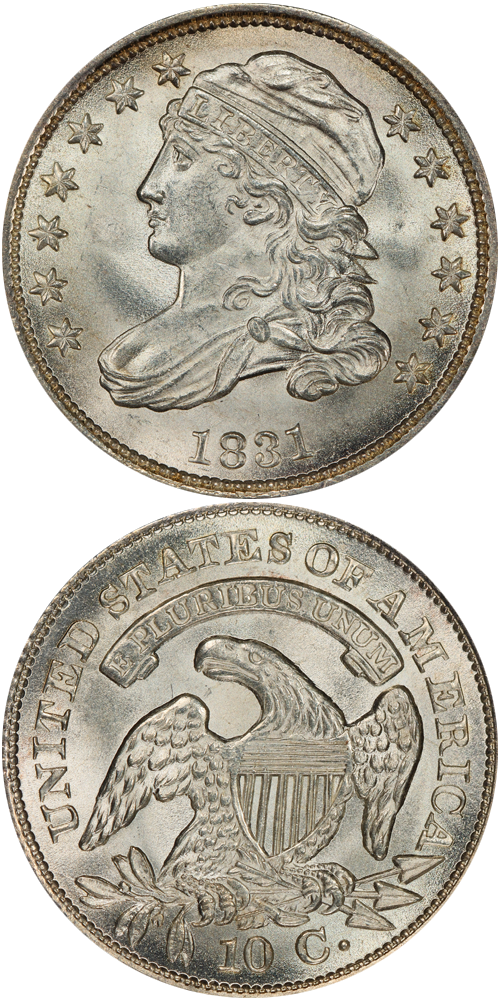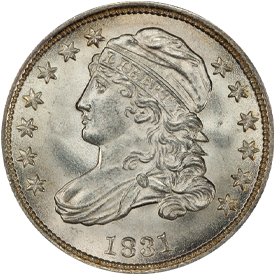Designed by: John Reich (adapted from)
Issue Dates: 1828-1837
Composition: 88.24% silver, 11.76% copper
Diameter: 17.9 mm (with some variation)
Weight: 2.69 grams (41.51 grains)
Edge: Reeded
Business Strike Mintage: 6,778,350
This variety is an adaptation of the previous 1809-1827 style and is the same except for certain minor modifications. The diameter is slightly smaller, and the border has denticles spaced closer together than on the previous type (although some transitional pieces have the old denticle style). The stars are slightly smaller, and there is some subtle restyling.
Dimes of this format were made from 1828 through 1837 inclusive. No dates are rarities, although there are several elusive varieties within the range. Examples are available in all grades from Good through Uncirculated, with Very Good to Very Fine being the most often seen. Uncirculated pieces are elusive, and ones in higher states of the Uncirculated category are rare.
Further Reading
Two varieties exist of 1828 dimes, the Large Date (with curl-base No. 2) and the Small Date. Earlier, it was believed that the Large Date variety was struck in an open collar and was of larger diameter than the Small Date, but measurement of extant specimens reveals that both Large Date and Small Date varieties were produced in a closed collar and both are of like diameter. The Small Date variety, however, has denticles which are closely spaced and which are similar to the closely-spaced denticles of later issues, while the Large Date has widely spaced denticles similar to the configuration of 1809-1827. Neither variety is particularly rare, although higher grade specimens are elusive.
Dimes of 1829 exist in a number of different varieties, some of which reflect the transition between the old denticle style and the new, with several having old-style reverses with widely spaced denticles. All in all, at least a dozen die varieties have been identified. Examples of the date can be readily found in various grades, although Uncirculated pieces are elusive. As is true of other dates in this era, a few scattered Proofs were struck for presentation purposes and are exceedingly rare today.
At least eight varieties are known of the 1830 dime, of which two have the 1830/29 overdate. So far as I know, this variety was unknown to numismatists until the late 1960s, when it was discovered by Don Taxay. At first believed unique, the variety was discovered in duplicate, triplicate, and larger quantities, and now the issue is fairly common, although not all show the overdate feature clearly. Two different reverses are known with the overdate obverse die, making two distinct combinations. As a date, 1830 dimes are plentiful and are available in all grades, although higher condition pieces require some searching to locate.
Capped Bust dimes of the dates 1831 through 1837 are readily available in all grades, although those dated 1837 are scarcer than earlier issues. Numerous die varieties can be obtained by the specialist. Several are listed in A Guide Book of United States Coins, with many more being enumerated within the pages of Early United States Dimes 1796-1837. Within this span, most examples seen are in grades from Very Good to Extremely Fine, although AU coins occur with frequency. Most Uncirculated pieces fall into the MS-60 category, with MS-63 pieces being decidedly rare. Strictly MS-65 coins are very rare.







